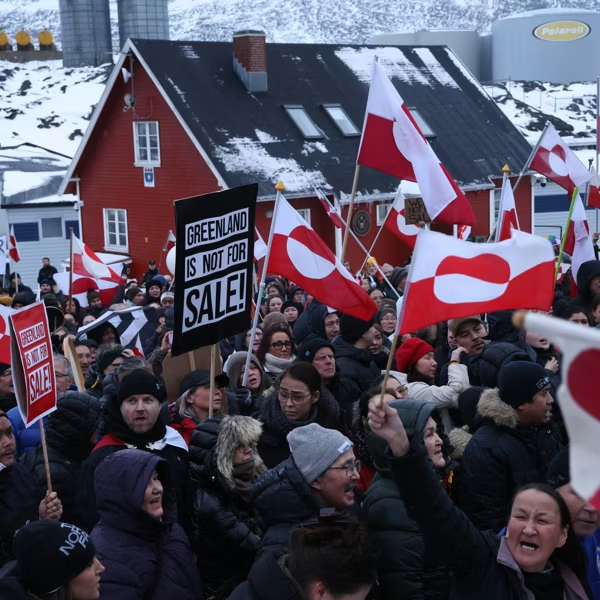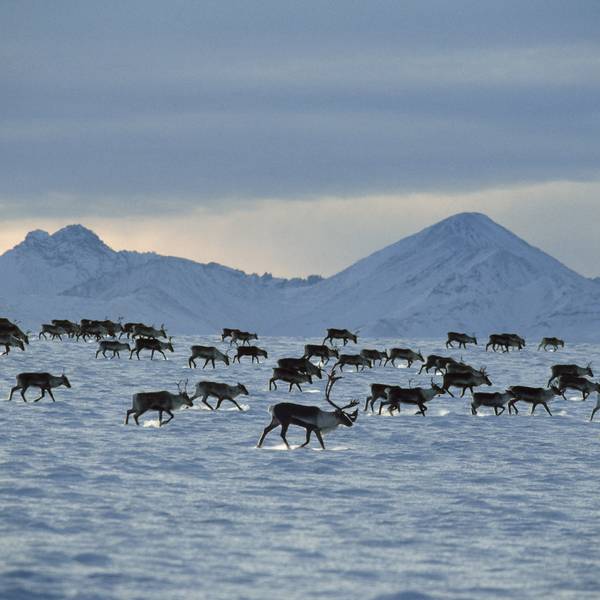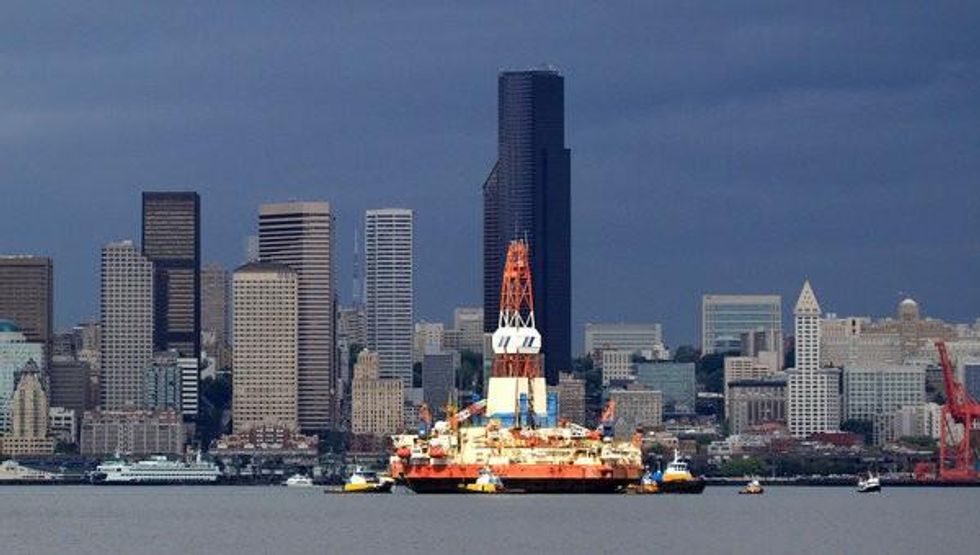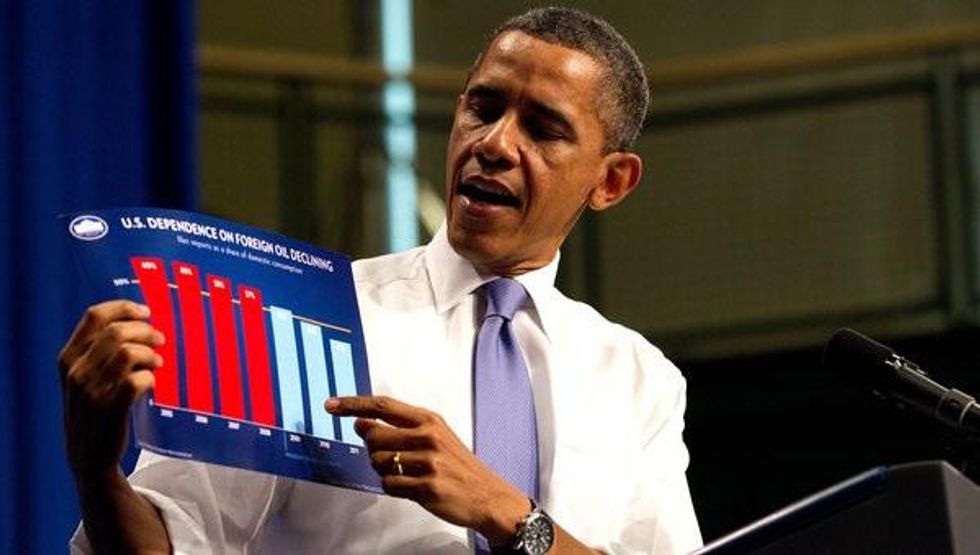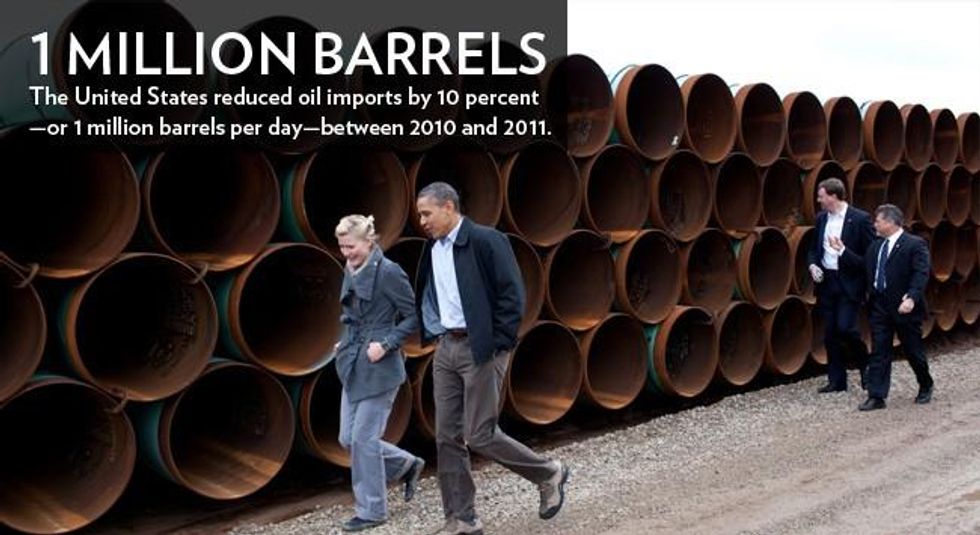President Barack Obama, who once elevated the hopes of many US environmentalists by promising to be a 'transformative' president -- one whose term, as he said, would mark "the moment when the rise of the oceans began to slow and our planet began to heal" -- may yet be the president remembered for passing on a potentially historic opportunity to end, or at least curb, the practice of dangerous offshore drilling.
A frontpage report in today's New York Times paints the picture of a president eager to open a gateway to arctic drilling that members of his own energy and climate change advisory panel thought was both surprising and "improbable".
Even as the full impact of the BP spill was still being determined in the Gulf, according to the Times, Obama took the initiative in clearing a regulatory pathway that would allow oil companies -- specifically a proposal by oil giant Shell -- to start drilling test wells off the Alaskan coast. "The president," write John Broder and Clifford Krauss for the Times, was "writing a new chapter in the nation's unfolding energy transformation, in this case to the benefit of fossil fuel producers."
Environmentalists were shocked by the report. "We never would have expected a Democratic president -- let alone one seeking to be 'transformative' -- to open up the Arctic Ocean for drilling," Michael Brune, executive director of the Sierra Club, told the Times.
"We don't think there should be drilling in the Arctic, period." --Rebecca Noblin, Center for Biological Diversity
Last week, more than 1 million people called on Obama to save the Arctic from oil drilling, by delivering a million signatures to the White House, and gathering outside to ask the president to stop Shell Oil from drilling this summer.
"Shell's ships are already on the way to drill in the icy Arctic waters, putting human life, polar bears and whales at risk in harsh, stormy conditions," said Miyoko Sakashita, oceans director at the Center for Biological Diversity (CBD), which has worked for many years to keep offshore drilling out of the Arctic Ocean. "President Obama has a small window to stop Shell from spoiling the Arctic, and that's exactly what people across the country are asking him to do."
"The
Obama administration has been rubber-stamping Shell's drill permits one after another," Subhankar Banerjee, photojournalist and editor of the soon to be released
Arctic Voices: Resistance at the Tipping Point, said in response to the
Times article. "By approving these operations in the Beaufort and Chukchi Seas of Alaska, the administration is about to commit a major crime. No one knows how to clean up oil from underneath the ice or in the extremely harsh weather of the Arctic. If Shell is allowed to drill there come July, they will kill the Arctic Ocean, and along the way destroy the traditional culture of the Inupiat communities."
Banerjee said people must fight to stop the plan on behalf of this generation, and "for all future generations."
"We don't think there should be drilling in the Arctic, period," said Rebecca Noblin, Alaska director at CBD, which has blocked every offshore drilling proposal in the Arctic since 2007 and most recently filed a legal challenge against new air permits that would allow Shell to drill there this summer. Shell has returned the favor by filing suit against CBD and other environmental groups in a series of preemptive legal maneuvers.
But as environmental groups try to ratchet up pressure and oil companies flex their financial and legal muscle, observers notice that Obama's White House has drifted further from its earlier posture as an environmentally concerned administration to one bent on dodging political attacks by tacking towards the Republican position, which advocates an aggressive drilling policy.
"Gone are the urgent statements warning of melting glaciers and rising sea levels," writes Steven Dennis in Roll Call. "Indeed, the energy and environment page at WhiteHouse.gov now shows a photo of the president walking in front of segments of oil pipeline, and the White House never neglects an opportunity to tout its support for domestic oil and natural gas drilling. In briefings on background, senior administration officials now talk about exporting fracking technology."
* * *
New York Times: New and Frozen Frontier Awaits Offshore Oil Drilling
"We never would have expected a Democratic president -- let alone one seeking to be 'transformative' -- to open up the Arctic Ocean for drilling," said Michael Brune, executive director of the Sierra Club. [...]
Frances Beinecke, president of the Natural Resources Defense Council and a commission member, characterized the exploration as "a reckless gamble we cannot afford."
But the president concluded that the reward was worth the risk, and created an unusual interagency group, overseen by Heather Zichal, who was an environmental adviser to the Obama campaign, to clear Shell's path through the often fractious federal regulatory bureaucracy. [...]
Other oil companies are already lining up to join Shell in the Arctic...
Other oil companies are already lining up to join Shell in the Arctic, which company executives say could eventually yield a million barrels a day of crude -- or more than 10 percent of current domestic output. Among the Inupiat who live closest to the proposed drilling, the project continues to generate tension and debate. Although they depend on oil production for jobs and tax revenue, they rely on the ocean for much of their food and culture.
"I'm worried because we live off the ocean, the bowhead whale, the beluga, the walrus, the bearded seal," said Tommy Olemaun, president of the Native Village of Barrow, an Eskimo tribal organization. "The ocean is our garden."
And: Pressures to Drill Started During 2008 Presidential Campaign
The 2008 campaign played out amid near-record gasoline prices. The Bush administration and the McCain campaign pushed for lifting the Congressional moratorium on most offshore drilling, and Republican campaign rallies were punctuated by cries of "Drill, baby, drill."
Sarah Palin, then the Republican governor of Alaska, not yet called up to the national stage, cheered what she called Mr. Obama's "flip-flopping" to her side. "Pretty cool," she said in an e-mail to an aide that came to light years later, but added: "Wrong candidate."
Mr. Obama, who secured the Democratic nomination in June [2008], was more hesitant, expressing support for continuing the moratorium. But as high gasoline prices persisted, he began to waver.
Near the end of July, he met late one night in Chicago with a delegation of oil company chief executives, including Marvin E. Odum, Shell's North American president. A few days later, Mr. Obama announced a major policy shift, saying he would accept new offshore drilling as part of a broader energy policy, but only if it included an end to some tax breaks for oil companies and federal incentives for alternative fuels.
"Like all compromises," Mr. Obama said at the time, "this one has its drawbacks. It includes a limited amount of new offshore drilling, and while I still don't believe that's a particularly meaningful short-term or long-term solution, I am willing to consider it if it's necessary to actually pass a comprehensive plan."
Sarah Palin, then the Republican governor of Alaska, not yet called up to the national stage, cheered what she called Mr. Obama's "flip-flopping" to her side. "Pretty cool," she said in an e-mail to an aide that came to light years later, but added: "Wrong candidate."
* * *
Roll Call: Obama Steers Clear of Climate
President Barack Obama's first Earth Day proclamation in 2009 was an urgent call to address global warming. This year? The word "climate" didn't even get a mention. [...]
Gone are the urgent statements warning of melting glaciers and rising sea levels. Indeed, the energy and environment page at WhiteHouse.gov now shows a photo of the president walking in front of segments of oil pipeline, and the White House never neglects an opportunity to tout its support for domestic oil and natural gas drilling. In briefings on background, senior administration officials now talk about exporting fracking technology, which has caused natural gas production to boom and prices to fall. [...]
He did tell Rolling Stone magazine last month that climate change would remain a priority. "I suspect that over the next six months, this is going to be a debate that will become part of the campaign, and I will be very clear in voicing my belief that we're going to have to take further steps to deal with climate change in a serious way," Obama said. "There's a way to do it that is entirely compatible with strong economic growth and job creation."
But scientists such as NASA's James Hansen have taken the president to task for not making climate change a higher priority.
# # #


